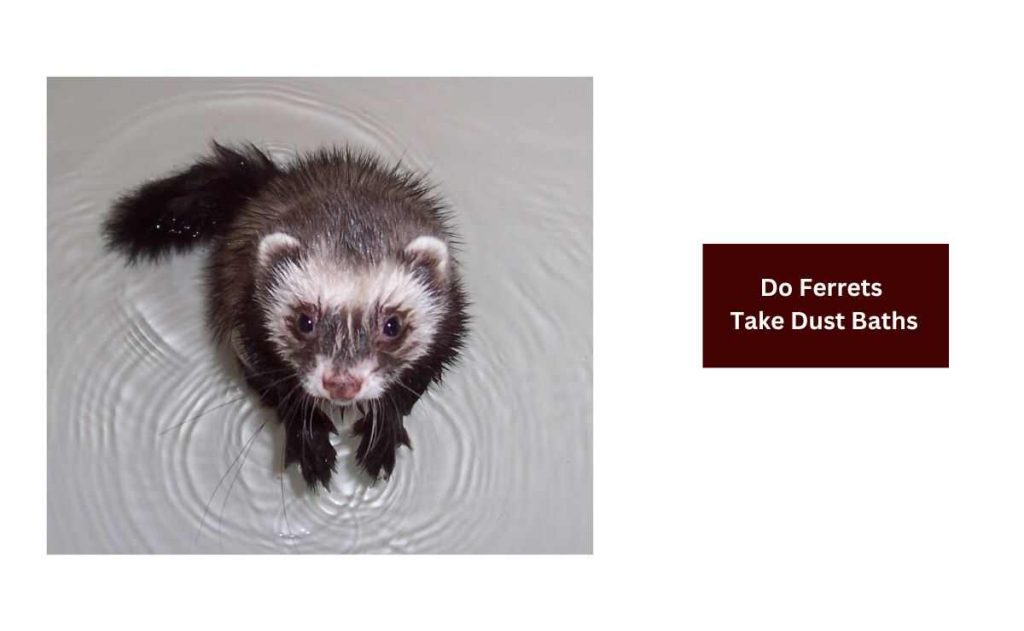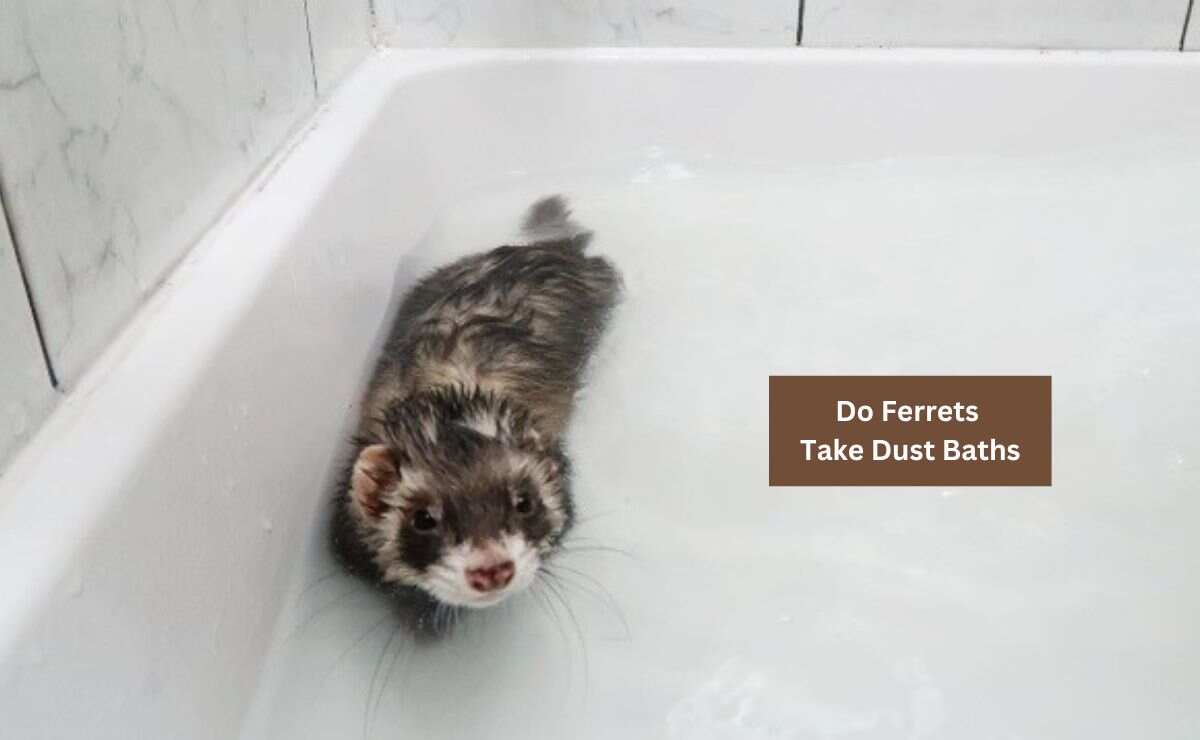Ferrets are fascinating creatures as pets. But we often get confused when comes to their cleaning or bathing. As chinchillas, hamsters, or other small animals take dust baths to clean themselves, many owners ask do ferrets take dust baths?
Actually, they don’t. They do not have a natural inclination for dust baths. Ferrets are meticulous groomers and prefer to keep themselves clean in a different way. Read on to know more on this topic.
What is a dust bath?
A dust bath might sound odd, but it’s a common and essential practice for various animals. This cleansing process is their way of staying clean and pest-free whether it’s a cat, dog, or even a chicken, rolling or shaking in a patch of dry, loose dirt or sand.
It’s not just a quirky behavior; it serves a vital purpose. The main thing is to remove dirt, parasites, and other undesirable elements from their fur or feathers. This practice is not limited to our domestic companions; it extends to diverse creatures.
Each species may have its specific reasons for a dust bath, but the overarching benefit is cleanliness and freedom from pests. Beyond hygiene, research has shown that dust bathing has a calming effect on animals, acting as a natural stress reliever.
So, the next time you catch your pet or an animal friend enjoying a dust bath, rest assured that it’s a natural and beneficial behavior. They’re simply taking a spa day in the dirt, ensuring they stay not only clean but also emotionally and physically healthy.
Do Ferrets Take Dust Baths?

Dust baths are a common behavior seen in many animals, particularly those with fur or feathers. It is a way for them to keep their coats clean and healthy.
Unlike some other small mammals, such as chinchillas, ferrets do not typically take dust baths. Instead, they have natural oil called sebum on their skin, which helps keep their fur clean and shiny. Ferrets have a grooming routine that involves licking themselves to distribute the oils and removing dirt or debris from their fur.
Ferrets use their saliva to groom and bathe themselves. They use their tongues to lick off dirt and oil from their skin. They also use their feet to rub off any dirt and hair.
There are some instances where ferrets may exhibit behavior that looks similar to a dust bath. For example, they may roll around on the floor or in their bedding. This behavior is more likely a form of play or relaxation rather than an actual attempt to clean themselves.
Although ferrets do not take dust baths, they still require regular grooming to maintain their fur and overall health. This includes brushing their coat to remove any loose hairs and bathing them with ferret-specific shampoo as needed. Regular grooming can help to prevent matting, odor, and potential health issues.
Why Ferrets Don’t Take Dust Baths?
Ferrets are unique mammals that don’t partake in the common ritual of dust baths like some of their furry animals. They don’t get any benefit from this type of bath. In fact, it’s not advisable to provide them with a dust bath.
Typically, mammals indulge in dust baths for reasons like getting wet, drying off, and keeping parasites at bay. However, the ferret has its own distinctive way of maintaining cleanliness, and a dust bath is not part of their hygiene routine.
While some pets and wild animals find joy and benefits in rolling around in sand or mud, ferrets have their own methods. So, if you’re a ferret owner, there’s no need to worry about excluding them from the dust bath club. They have their own quirky and effective ways of staying clean, and a dust bath is not on their to-do list.
Can You Bath Ferrets With Water?

Ferrets are very clean animals and they have their own method of cleanliness. They regularly lick their bodies to remove dirt and debris. So, giving them a water bath is not necessary and not recommended
However, there are moments when you might need to intervene in their grooming routine. When your mischievous ferret decides to explore the house plant, raid the flour cabinet, or engage in some other ferret mischief, this intervention is necessary.
As for whether ferrets like baths, well, that’s a bit of a mixed bag. It largely depends on the individual ferret. Some ferrets absolutely despise water, while others can’t wait to take a splash. Generally speaking, ferrets lean towards the “not a fan” side when it comes to baths, but, as with many things in life, there are exceptions.
Interestingly, during the warmer months, you might find your ferret more open to water-related activities. The heat brings them to seek ways to cool down, and one of their peculiar pastimes includes digging in their water bowl.
Will A Bath Minimize Ferret’s Odor?
It’s a common misconception that bathing will minimize the distinctive smell of ferrets. In reality, it can have the opposite effect. The unique ferret smell is released from oil glands that are distributed all over their bodies.
When you bathe a ferret, you strip away these oils, allowing their body to produce more. Over bathing can lead to skin irritation, potentially causing a rash and intensifying the ferret’s natural scent.
Determining how often to bathe your ferret is a crucial consideration, as excessive bathing can harm their sensitive skin. The good news is that you generally don’t have to worry much about scheduling baths for your ferret because they don’t require regular washing.
Only give your ferret a bath when it genuinely gets dirty due to escapades like exploring a house plant or indulging in some mischievous behavior. The one exception to this rule is during the summer heat, where a gentle water bath (without shampoo) can help your ferret cool down.
How To Give A Ferret A Bath?
Ferrets have a higher body temperature than humans, so use warm water for the bath, approximately between 37°C to 40°C (99°F to 104°F). Ensure the water level allows your ferret to stand comfortably without being too deep. You can bath a ferret by maintaining the following steps:
- Gently place your ferret in the water, deep enough for them to move comfortably. Since most ferrets aren’t thrilled about bath time, distract them with a tasty treat to keep them calm.
- Apply a small amount of shampoo (ferret-safe) to your ferret. Start with the body, avoiding the head. Massage your ferret’s tummy, tail, and back legs before moving on to the rest of the body.
- Rinse your ferret by gently pouring warm water over them. Be cautious around the head to prevent shampoo from getting into their eyes or mouth. You can either use a faucet or a mug for rinsing.
- Once bathed, lift your ferret out of the water, remove excess water, and wrap them in a towel. Drying your ferret is a lively experience, as they may exhibit a burst of energy, jumping, running, and generally acting wild.
Conclusion
Ferrets do not take dust baths like some other animals and they have their own unique grooming routine to keep their fur clean and healthy. So don’t get too engaged to give them a dust bath.
Well, you can give them water bath if necessary. It will keep them clean and healthy.
